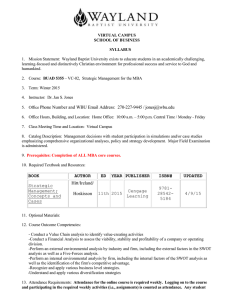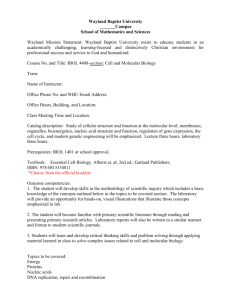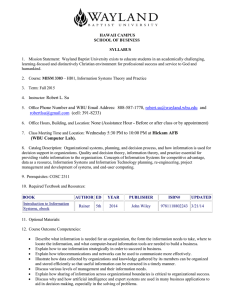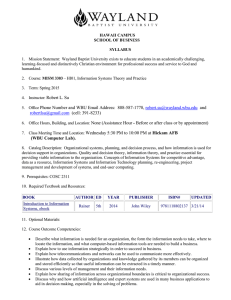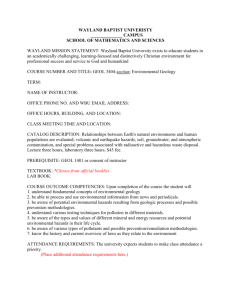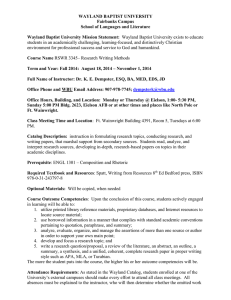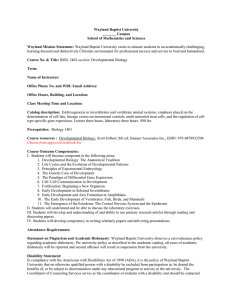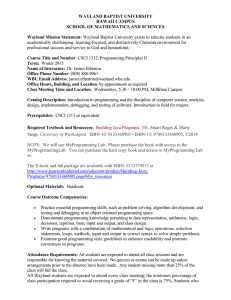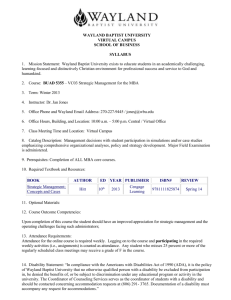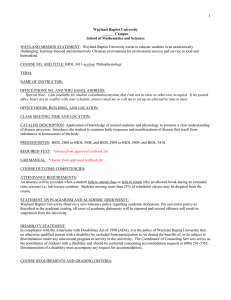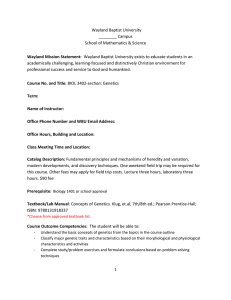WAYLAND BAPTIST UNIVERSITY _________ CAMPUS SCHOOL OF MATHEMATICS & SCIENCES
advertisement
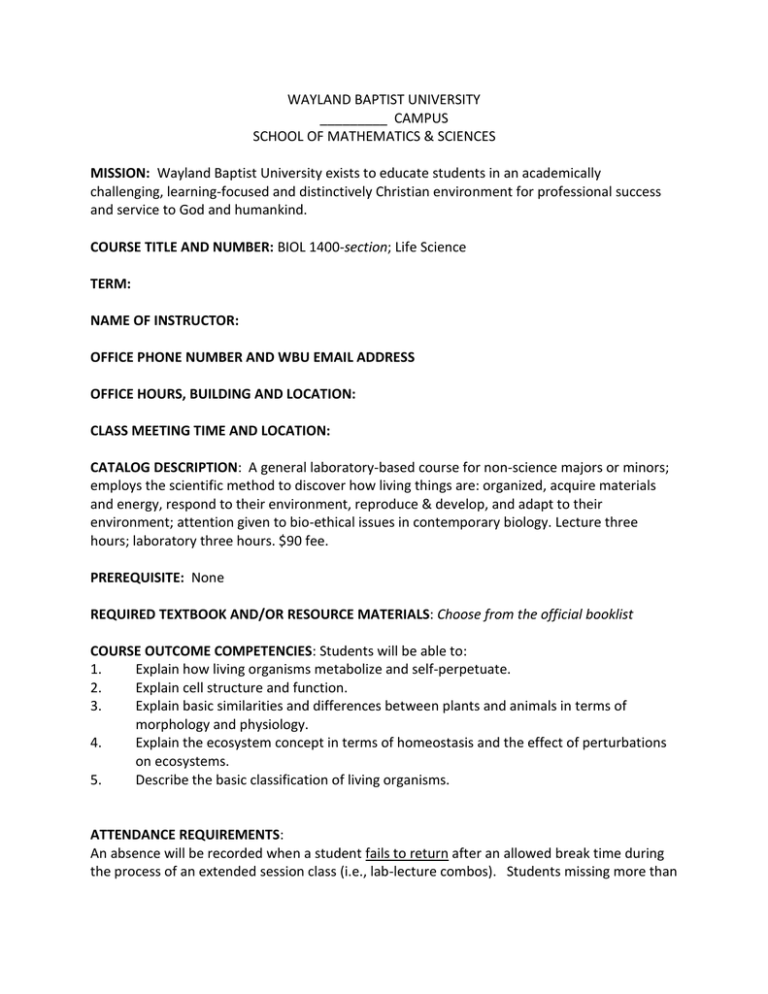
WAYLAND BAPTIST UNIVERSITY _________ CAMPUS SCHOOL OF MATHEMATICS & SCIENCES MISSION: Wayland Baptist University exists to educate students in an academically challenging, learning-focused and distinctively Christian environment for professional success and service to God and humankind. COURSE TITLE AND NUMBER: BIOL 1400-section; Life Science TERM: NAME OF INSTRUCTOR: OFFICE PHONE NUMBER AND WBU EMAIL ADDRESS OFFICE HOURS, BUILDING AND LOCATION: CLASS MEETING TIME AND LOCATION: CATALOG DESCRIPTION: A general laboratory-based course for non-science majors or minors; employs the scientific method to discover how living things are: organized, acquire materials and energy, respond to their environment, reproduce & develop, and adapt to their environment; attention given to bio-ethical issues in contemporary biology. Lecture three hours; laboratory three hours. $90 fee. PREREQUISITE: None REQUIRED TEXTBOOK AND/OR RESOURCE MATERIALS: Choose from the official booklist COURSE OUTCOME COMPETENCIES: Students will be able to: 1. Explain how living organisms metabolize and self-perpetuate. 2. Explain cell structure and function. 3. Explain basic similarities and differences between plants and animals in terms of morphology and physiology. 4. Explain the ecosystem concept in terms of homeostasis and the effect of perturbations on ecosystems. 5. Describe the basic classification of living organisms. ATTENDANCE REQUIREMENTS: An absence will be recorded when a student fails to return after an allowed break time during the process of an extended session class (i.e., lab-lecture combos). Students missing more than 25% of the classes may be dropped from the course. No make-up exams will be given, unless arrangements are made in advance of foreseen absences, emergencies excepted. Statement on Plagiarism and Academic Dishonesty: Wayland Baptist University observes a zero tolerance policy regarding academic dishonesty. Per university policy as described in the academic catalog, all cases of academic dishonesty will be reported and second offenses will result in suspension from the university. DISABILITY STATEMENT: Disability Statement – In compliance with the Americans with Disabilities Act of 1990 (ADA), it is the policy of Wayland Baptist University that no otherwise qualified person with a disability be excluded from participation in, be denied the benefits of, or be subject to discrimination under any educational program or activity in the university. The Coordinator of Counseling Services serves as the coordinator of students with a disability and should be contacted concerning accommodation requests at (806) 291-3765. Documentation of a disability must accompany any request for accommodations. COURSE REQUIREMENTS AND GRADING CRITERIA: A. Students are expected to read textbook assignments and compile a complete set of lecture notes. They are encouraged to become familiar with the recommended reference materials. B. Lectures are illustrated with a variety of visual aids and microscopic observations. Students are encouraged to ask questions and participate in discussion in both lecture and laboratory sessions. C. Projects and Other Assignments: Students are required to search scientific references. A short laboratory research project is performed and written up by each student in order to become familiar with scientific methodology. D. Tests. Lecture exams (4-5 major exams per semester, plus a comprehensive final examination), may contain both objective and essay questions. Laboratory grades include practicals, lab exercises, and a laboratory research project. COURSE EVALUATION: Lecture Exams………………………………..………………………… Laboratory exercises, assignments, quizzes………………. Final Exam(comprehensive)……………………………………… University Grading System: A = 90 - 100 B = 80 - 89 C = 70 - 79 D = 60 - 69 F = Below 60 I = Incomplete + W = Withdrawal A grade of incomplete is changed if the deficiency is made up by midterm of the next regular semester, otherwise, it becomes "F". This grade is given only if circumstances beyond the student's control prevented completion of work during the semester enrolled and attendance requirements have been met. Students shall have protection through orderly procedures against prejudices or capricious academic evaluation. A student who believes that he or she has not been held to realistic academic standards, just evaluation procedures, or appropriate grading, may appeal the final grade given in the course by using the student grade appeal process described in the Academic Catalog. Appeals may not be made for advanced placement examinations or course bypass examinations. Appeals are limited to the final course grade, which may be upheld, raised, or lowered at any stage of the appeal process. Any recommendation to lower a course grade must be submitted through the Executive Vice President/Provost to the Faculty Assembly Grade Appeals Committee for review and approval. The Faculty Assembly Grade Appeals Committee may instruct that the course grade be upheld, raised, or lowered to a more proper evaluation. TENTATIVE SCHEDULE (COURSE OUTLINE): A. Introduction -Scientific Basis -Biological Basis B. Nature of Life -Metabolism -Perpetuation C. Cells D. Chemistry of Life E. Photosynthesis F. Respiration G. Nutrition/Transport -Plants -Animals H. Control Systems -Plants -Animals I. Reproduction -Asexual -Sexual J. Development -Plants -Animals K. Genetics -Mendelian -Non-Mendelain L. Adaptation -Gene Frequencies -Natural Selection M. Ecology -Definitions -Ecosystems --structure --function -Environmental -Problems/Solutions ADDITIONAL INFORMATION: CELL PHONES: There will be NO class disruptions due to cell phones. Ringers must be turned off prior to class. If you have an emergency, quietly leave the classroom. If disruptions occur, points may be deducted from your final grade. I f examinations or quizzes require a calculator, bring one that is NOT integrated with your cell phone. Wayland Baptist University Standards for Writing Good writing exhibits the following characteristics: 1. Content is clearly purposeful, demonstrating depth, insight, and critical thinking. 2. Structure and organization are effective, coherent, and logically developed. 3. Conventions are conscientiously observed. This includes—-but is not limited to—sentence structure, usage, and mechanics such as punctuation, grammar, and spelling. 4. Style is effective. Style has been defined as “the personality of the writing.” It includes—but is not limited to—word choice, sentence variety, voice, and attention to audience. 5. Resources are quoted and cited correctly, exhibiting quality and breadth. Plagiarism is unacceptable. See Plagiarism Statement in WBU Academic Catalog. Revision: 1/12/16
